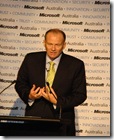Culture Change – A Web 2 Far?
The establishment of a Government Taskforce is rarely a moment for praise. In this instance however it is warranted. Ministers Tanner, Ludwig and former Special Minister of State John Faulkner have put a challenge before their colleagues that could fundamentally re-shape how Australia’s public services are administered and delivered. It is a credit to the combined Cabinet that they have at the very least accepted the need to look at this challenge.
At the Microsoft Politics and Technology Forum in February, Minister Tanner acknowledged that web technologies would only ever be enablers. He was right. No technology of itself can change how people, administrative structures and hierarchies interact with information. How information is collected, assembled, disseminated, analysed and communicated will always be dependent upon the policies and cultures put in place by those with decision making power. Even with the most advanced information technologies possible the control of information will remain in the hands of those who have this power. To alter this dynamic the technologies and decision makers must enable information to flow directly to and from those who generate it and those who seek to use it. When this occurs power relationships are redefined and may ultimately be changed.
Accepting and embracing the challenge to amend power relationships within Government is by any Sir Humphrey assessment ‘courageous’. Minister Tanner in his address at the launch of the Taskforce yesterday acknowledged this very fundamental when he said:
“But perhaps the biggest challenge for government -- and for this Taskforce – is (to) build a new culture of openness, a presumption of openness.”
Being open to new channels of information, responsive to new forums for public discussion, accepting of new models for the flow of information will be the start of a cultural change in the Australian Public Service and in Australian democracy. The establishment of a web site for the Taskforce will enable this conversation to begin however a change of culture rarely comes easily. Andrew Podger in his recent Crikey Conversations interview with Bernard Keane suggested that in the area of openness the culture of the Public Service is set almost entirely by the culture of Ministers and Ministerial staff. He indicated that his focus on changing culture would be on convincing these people that they should be more tolerant to allowing ‘things’ to come out that might be embarrassing from time to time.
Microsoft endorses, supports and welcomes the establishment of the Taskforce. We are supporting the Taskforce’s Project Fund by making available $2.45m from the residual of our Federal Services Provision Fund. That fund was established to help the Federal Government get the most from its information technology investments. The projects and competitions that the taskforce chooses to support will undoubtedly satisfy that goal.
Those who want to see another proprietary versus open source battle in the work of this Taskforce will be disappointed. The work of this Taskforce could change forever how we as citizens deal with Government and how the Public Service embraces citizens in their Government. That may be a lofty and ambitious goal but it is a possibility worth pursuing. How software code is written and licensed and how software is commercially distributed will be forever interesting, fascinating and the subject of passionate debate. However, it is a side debate to how information technology is and can enable what is happening now and in the future to shape the lives of citizens. The only ‘victory’ for any of us will be if our participatory democracy is made stronger by the work of this Taskforce.
I wish Nicholas Gruen and his Taskforce members vision, courage, energy, pragmatism and good luck.
Simon Edwards, Head of Government Affairs

